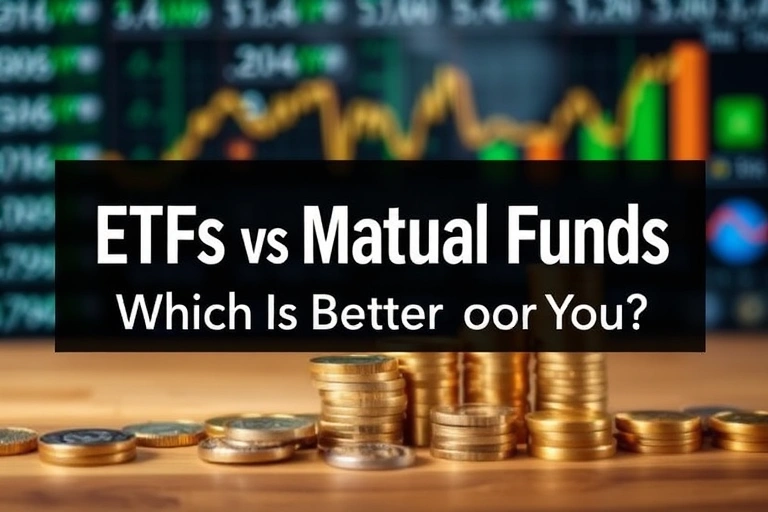ETFs vs Mutual Funds: Which Is Better for You?
Introduction
Investing has become an essential aspect of personal finance, with numerous options available to help individuals grow their wealth. Among these options, Exchange-Traded Funds (ETFs) and Mutual Funds are two popular choices that investors often consider. Both serve the purpose of pooling funds from multiple investors to buy a diversified portfolio of assets, but they have distinct characteristics that may make one more suitable than the other depending on individual goals and circumstances. In this article, we will explore the nuances of ETFs vs mutual funds, helping you determine which investment option is best for building a resilient portfolio.

Main Development
When comparing ETFs and mutual funds, it’s crucial to understand their fundamental differences. ETFs are traded on stock exchanges, similar to individual stocks, which means their prices fluctuate throughout the trading day. Conversely, mutual funds are typically bought and sold at the end of the trading day at a price known as the Net Asset Value (NAV).
One of the primary advantages of ETFs is their liquidity. Investors can buy and sell ETFs at any time during market hours, allowing for greater flexibility and real-time pricing. This feature can be particularly beneficial for active traders looking to capitalize on market movements. On the other hand, mutual funds are generally more suited for long-term investors who prefer a buy-and-hold strategy without the need to monitor daily price fluctuations.
Another significant difference lies in the fee structures associated with each investment type. ETFs typically have lower expense ratios compared to mutual funds, which often come with higher management fees due to active management strategies. However, it’s essential to consider brokerage fees when purchasing ETFs, as these can add to the overall cost of investing. For mutual funds, investors may face sales loads or redemption fees, which can also impact returns.
🎥 Vídeo relacionado ao tópico: ETFs vs Mutual Funds: Which Is Better for You?
Analysis and Benefits
Understanding the benefits of each investment type is critical when deciding between ETFs and mutual funds. ETFs offer several advantages, including:
- Tax Efficiency: ETFs are generally more tax-efficient than mutual funds due to their unique structure, which allows investors to avoid capital gains distributions until they sell their shares.
- Diversification: Like mutual funds, ETFs provide exposure to a broad range of assets, helping investors build a diversified portfolio with less risk.
- Transparency: Most ETFs disclose their holdings on a daily basis, enabling investors to know exactly what assets they own at any given time.
Mutual funds, on the other hand, come with their own set of benefits:
- Active Management: Many mutual funds are actively managed, providing the potential for higher returns through professional management and research.
- Automatic Reinvestment: Mutual funds often allow for automatic reinvestment of dividends, simplifying the process of compounding returns.
- Accessibility: Mutual funds may have lower minimum investment requirements, making them more accessible to novice investors.
Ultimately, the choice between ETFs and mutual funds boils down to individual investment goals, trading preferences, and risk tolerance. Both options can play a valuable role in constructing a resilient portfolio that aligns with one’s financial objectives.
Practical Implementation
Implementing either ETFs or mutual funds into your investment strategy requires careful planning and consideration. Begin by assessing your financial goals and investment horizon. If you are looking for short-term gains and enjoy active trading, ETFs may be the better choice. However, if you prefer a long-term investment strategy with potential professional management, mutual funds might suit your needs.
To get started with ETFs, consider the following steps:
- Research: Investigate various ETFs that align with your investment strategy, focusing on factors like expense ratios, performance history, and the underlying index or asset class.
- Open a Brokerage Account: Choose a reputable brokerage platform that allows you to trade ETFs without high commission fees.
- Diversify: Build a diversified ETF portfolio that includes various asset classes, such as stocks, bonds, and commodities.
For mutual funds, take these steps:
- Evaluate Fund Options: Look for mutual funds that match your investment objectives, considering factors like management style, performance, and fees.
- Understand the Fees: Be aware of any sales loads or management fees that may apply to the mutual funds you are considering.
- Set Up Automatic Investments: Consider setting up a systematic investment plan to automate contributions to your chosen mutual funds.
No matter which option you choose, remember that consistent contributions and a diversified approach are essential for building a resilient portfolio that can weather market fluctuations.

Frequently Asked Questions
What are the key differences between ETFs and mutual funds?
ETFs are traded on stock exchanges with fluctuating prices throughout the day, while mutual funds are bought and sold at a fixed price at the end of the day. Additionally, ETFs typically have lower expense ratios compared to actively managed mutual funds.
Are ETFs more tax-efficient than mutual funds?
Yes, ETFs are generally more tax-efficient due to their unique structure that allows for fewer capital gains distributions. This means investors can defer taxes until they sell their shares.
Can I invest in both ETFs and mutual funds?
Absolutely! Many investors choose to incorporate both ETFs and mutual funds into their portfolios to take advantage of the benefits each offers, thereby enhancing diversification and aligning with their investment strategies.
What should I consider when choosing between ETFs and mutual funds?
When deciding between ETFs and mutual funds, consider factors such as your investment goals, trading preferences, risk tolerance, and the associated fees of each option. It’s essential to choose the investment type that aligns best with your financial objectives.
How can I build a resilient portfolio using ETFs and mutual funds?
To build a resilient portfolio, focus on diversification by including a mix of asset classes, such as stocks, bonds, and international investments. Regularly review and rebalance your portfolio to maintain your desired asset allocation and adapt to changing market conditions.
Conclusion
In summary, both ETFs and mutual funds have their unique advantages and can serve different purposes within an investment strategy. By understanding the differences between ETFs vs mutual funds, you can make an informed decision that aligns with your financial goals. Whether you choose to invest in ETFs, mutual funds, or a combination of both, the key to success lies in building a resilient portfolio that can withstand market fluctuations and support your long-term financial objectives.